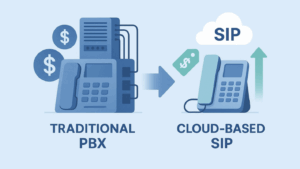
What to Look for in the Best VoIP Phone System for a Small Business
Why VoIP is Crucial for Modern Businesses
VoIP phone system technology is revolutionizing business communication. By transmitting voice over the internet instead of traditional phone lines, VoIP simplifies communication, reduces costs, and offers a suite of advanced features that enhance daily operations.
Key Benefits of VoIP Phone System:
- Cost Savings: VoIP reduces costs through lower call rates and minimal hardware needs.
- Flexibility and Mobility: Use VoIP anywhere with an internet connection—ideal for businesses with remote workers.
- Advanced Features: Integrations with CRM systems, voicemail-to-email, call recording, and more boost productivity.
Companies are shifting to VoIP because it not only improves communication but also integrates easily with other business tools. For example, you can connect VoIP with Microsoft Teams for streamlined collaboration.
Switching to a VoIP phone system isn’t just for enterprises, but ideal for small and medium-sized businesses looking to modernize their operations and stay competitive. Check out our detailed guide to learn how VoIP can transform your business communications.

Internet Calls: The New Standard
In a VoIP system, your voice is converted into digital packets and sent over the internet. This is different from the old Public Switched Telephone Network (PSTN), which uses analog signals and copper phone lines.
Analog vs. Digital
Traditional phone systems use analog signals that travel over physical lines. In contrast, VoIP uses digital signals. This makes it easier to integrate with other digital tools and services, like CRM systems and email.
Analog Phones:
- Use physical lines.
- Limited features.
- Higher costs for long-distance calls.
Digital VoIP Phones:
- Use the internet.
- Advanced features like call recording and voicemail-to-email.
- Lower costs, especially for international calls.
SIP Trunking: The Backbone of VoIP
Session Initiation Protocol (SIP) trunking is a method that enables VoIP to transmit voice calls over the internet. SIP trunking essentially replaces the traditional phone lines with a virtual one, allowing for more flexibility and scalability.
Benefits of SIP Trunking:
- Cost Savings: No need for expensive physical lines.
- Scalability: Easily add more lines as your business grows.
- Flexibility: Make calls from anywhere with an internet connection.
Why Switch to VoIP?
Switching to a VoIP phone system offers several advantages:
- Cost Savings: Lower call rates and minimal hardware needs.
- Flexibility: Make calls from any device with an internet connection.
- Advanced Features: Integrations with other business tools, voicemail-to-email, and more.
For more detailed insights, you can read about VoIP and SIP trunking and how they’re revolutionizing business communication. Additionally, you can explore how VoIP works and the benefits of SIP trunking to get a broader understanding of these technologies.

How Does a VoIP Phone System Work?
Data Packets: The Building Blocks
In a VoIP phone system, your voice is converted into digital data packets. These packets are small chunks of data that travel over the internet. Think of it like sending an email, but with your voice. When you speak, your voice is broken down into these packets, sent across the internet, and then reassembled at the other end.
Internet Connection: The Lifeline
A strong and reliable internet connection is crucial for VoIP to work effectively. Unlike traditional phone lines, VoIP relies on your internet bandwidth. If your internet connection is slow or unstable, you may experience poor call quality, dropped calls, or delays.
SIP Protocol: The Traffic Controller
The Session Initiation Protocol (SIP) is a set of rules that helps manage the data packets. SIP initiates, maintains, and terminates the call. It essentially acts like a traffic controller, ensuring that the data packets get to their destination smoothly. For more information on SIP, you can visit this detailed explanation.

Cloud-Based PBX: The Modern Switchboard
A cloud-based PBX (Private Branch Exchange) is the modern-day switchboard. In traditional systems, a physical PBX would route calls within an office. With VoIP, this function is handled by software in the cloud. This means you don’t need bulky hardware, and you can manage your phone system from anywhere.
Benefits of Cloud-Based PBX:
- Scalability: Easily add or remove lines.
- Flexibility: Manage your system from any location.
- Cost-Effective: No need for expensive hardware.
How It All Comes Together
When you make a call, SIP starts the session by sending a signal to the recipient’s device. Your voice is then converted into data packets and sent over the internet. The cloud-based PBX helps route these packets to the right place. Finally, SIP ends the session when the call is over.
Key Features of VoIP Phone Systems
When choosing a VoIP phone system, it’s important to understand the key features that can benefit your business. Here are some of the most essential features to look for:
Unlimited Calling
With VoIP, you get unlimited calling within the US and Canada. This can significantly reduce your phone bill, especially if your business makes a lot of long-distance calls. Some providers even offer unlimited international calling to specific countries, making it easier to connect with global clients.
Voicemail-to-Email
The voicemail-to-email feature transcribes your voicemails and sends them directly to your email inbox. This allows you to read your messages at your convenience and keeps track of important communications. It’s especially useful for professionals who are frequently on the go.
Call Recording
Call recording is an invaluable tool for training, quality assurance, and legal compliance. You can record calls automatically or manually and store them for future reference. This feature helps ensure that you never miss important details from your conversations.
Auto-Attendant
An auto-attendant acts as a virtual receptionist, directing callers to the appropriate department or individual without human intervention. This feature ensures that calls are handled efficiently, reducing wait times and improving caller satisfaction. It’s particularly beneficial for businesses without a dedicated receptionist or those experiencing high call volumes.
HD Voice
HD Voice offers high-definition sound quality, making your calls crystal clear. This feature reduces background noise and improves voice clarity, ensuring that you and your clients can communicate effectively.
Team Collaboration Tools
VoIP systems often come with team collaboration tools like instant messaging, video conferencing, and screen sharing. These tools make it easier for your team to collaborate, even if they are in different locations. For example, a small consultancy firm can have consultants working remotely from various locations, providing clients with timely services without geographical constraints.
CRM Integrations
Integrating your VoIP system with a Customer Relationship Management (CRM) system streamlines workflows and boosts productivity. This integration allows for click-to-call capabilities, call logging, and easy access to customer data during calls. It provides a holistic view of customer interactions, which is invaluable for sales and support teams.
Benefits of Using a VoIP Phone System
Switching to a VoIP phone system offers multiple advantages for small businesses. Let’s explore these benefits in detail:
Cost Savings
One of the most compelling reasons to switch to VoIP is the cost savings. Traditional phone systems often come with high setup costs and ongoing maintenance fees. VoIP, on the other hand, can reduce startup costs by as much as 90% over traditional phone services. Additionally, you get features like call waiting, auto-attendant, and voicemail-to-email at no extra cost.
For example, a small business can save significantly on international calls, as many VoIP providers offer lower rates compared to traditional phone services. This is particularly beneficial for companies with global clients.
Scalability
VoIP systems are highly scalable, making it easy to add or remove lines as your business grows or contracts. This flexibility is crucial for businesses that experience seasonal fluctuations or are in the growth phase. You can quickly scale your VoIP service to include new office locations and employees without the need for extensive infrastructure changes.
Mobility
With VoIP, your business communications are not tied to a specific location. Employees can make and receive calls from anywhere with an internet connection, using laptops, smartphones, or tablets. This mobility is essential for remote work setups and ensures that your team stays connected, no matter where they are.
These features not only improve efficiency but also improve customer satisfaction by ensuring smooth and effective communication.
Reliability
Unlike traditional phone systems that natural disasters or power outages can compromise, VoIP systems are hosted in protected data centers and monitored around the clock. This ensures that your business communications remain uninterrupted, even in adverse conditions. For instance, if your office loses power, incoming calls can be forwarded to another location or a mobile device.
Ease of Use
Setting up and using a VoIP phone system is straightforward. Most providers offer easy-to-follow instructions and 24/7 customer support. You can often use your existing hardware, reducing the need for new equipment. The setup process can typically be completed within minutes, allowing you to start making and receiving calls almost immediately.
How to Choose the Right VoIP Phone System
Choosing the right VoIP phone system for your small business involves several key steps. Let’s break it down:
Assess Your Needs
Start by understanding what your business requires from a VoIP system. Do you need advanced features like call recording, auto-attendant, or CRM integrations? Or are you looking for basic functionalities like unlimited calling and voicemail-to-email? Involve stakeholders from different departments to get a comprehensive view of the needs.
Compare Features
Once you know what you need, compare the features offered by different VoIP providers. Make a list of must-have features and nice-to-have features. Look for providers that offer a wide range of functionalities that can grow with your business. For example, if you plan to expand, features like scalability and team collaboration tools will be crucial.
Pricing
Price is an important factor, but it shouldn’t be the only one. Look at the total cost of ownership, which includes upfront costs, deployment, operational, and upgrade expenses. Some providers offer lower initial prices but may have hidden fees. Always read the fine print and understand what each pricing tier includes.
Reliability
Reliability is critical for business communications. Choose a provider with a high uptime guarantee and multiple data centers for redundancy. This ensures that your service remains uninterrupted even if a server fails. Look for providers that conduct regular audits of their data centers and support Multi-Factor Authentication (MFA) for added security.
Customer Support
Good customer support can make or break your experience with a VoIP provider. Look for providers that offer 24/7 customer support and have positive reviews about their service. Some providers limit support access at lower tiers, so ensure you get the support level you need.
Integrations
Your VoIP system should integrate seamlessly with other software you use, such as CRM systems or productivity tools like Microsoft Teams. This can save you time and improve productivity by streamlining workflows. Check the provider’s list of integrations and ensure they match your current tools.
Ease of Setup
Finally, consider how easy it is to set up the VoIP system. Most modern VoIP systems are user-friendly and come with detailed setup guides. Some providers even offer professional installation services. Ensure that the setup process is straightforward and doesn’t require extensive technical expertise.
Frequently Asked Questions about VoIP Phone Systems
What is a VoIP phone system?
A VoIP phone system (Voice over Internet Protocol) allows you to make and receive phone calls over the internet instead of traditional landlines. VoIP converts your voice into data packets, which are then transmitted online. This technology provides many advantages, including cost savings, flexibility, and advanced features like voicemail-to-email and call recording.
Can I use a VoIP phone without a provider?
While some VoIP phones can be used without a traditional phone provider, you will still need an internet connection and a VoIP service to handle call routing and other essential functions. Some services offer free VoIP options for computer-to-computer calls, but for business purposes, it’s best to use a reliable VoIP provider to ensure quality and support.
Why use VoIP instead of a cell phone?
Using a VoIP phone system instead of a cell phone offers several benefits:
- Cost Savings: VoIP can significantly reduce phone bills, especially for international and long-distance calls.
- Advanced Features: VoIP systems come with features like auto-attendant, call recording, and CRM integration that are not available on standard cell phones.
- Scalability: Easily add or remove lines as your business grows without the need for additional hardware.
- Mobility: VoIP allows you to make and receive calls from anywhere with an internet connection, making it ideal for remote work.
Conclusion
Choosing the right VoIP phone system can transform your business communications, making them more reliable, secure, and cost-effective. At SIP.US, we provide SIP trunking services that help businesses modernize their communication systems with ease.
Our SIP trunking services are designed for fast setup, offering an easy-to-use control panel that makes managing your communication needs straightforward. With our predictable pricing, you won’t have to worry about hidden fees or unexpected costs.
One of the standout features of SIP.US is our seamless integration with Microsoft Teams. This allows your team to use any compatible SIP device with Microsoft Teams, enhancing collaboration and ensuring that your existing investments in SIP devices are preserved.
Reliability and security are at the core of our services. We offer robust and secure networks, supported by multiple data centers to ensure redundancy. This means you can count on uninterrupted service even if one server goes down.
Our services also support advanced features like voicemail-to-email, call recording, and auto-attendant, making it easier for your team to stay connected and productive.
In summary, SIP.US offers a comprehensive VoIP solution that combines reliability, security, and advanced features with the flexibility to grow with your business. Ready to modernize your communications? Get started today.



